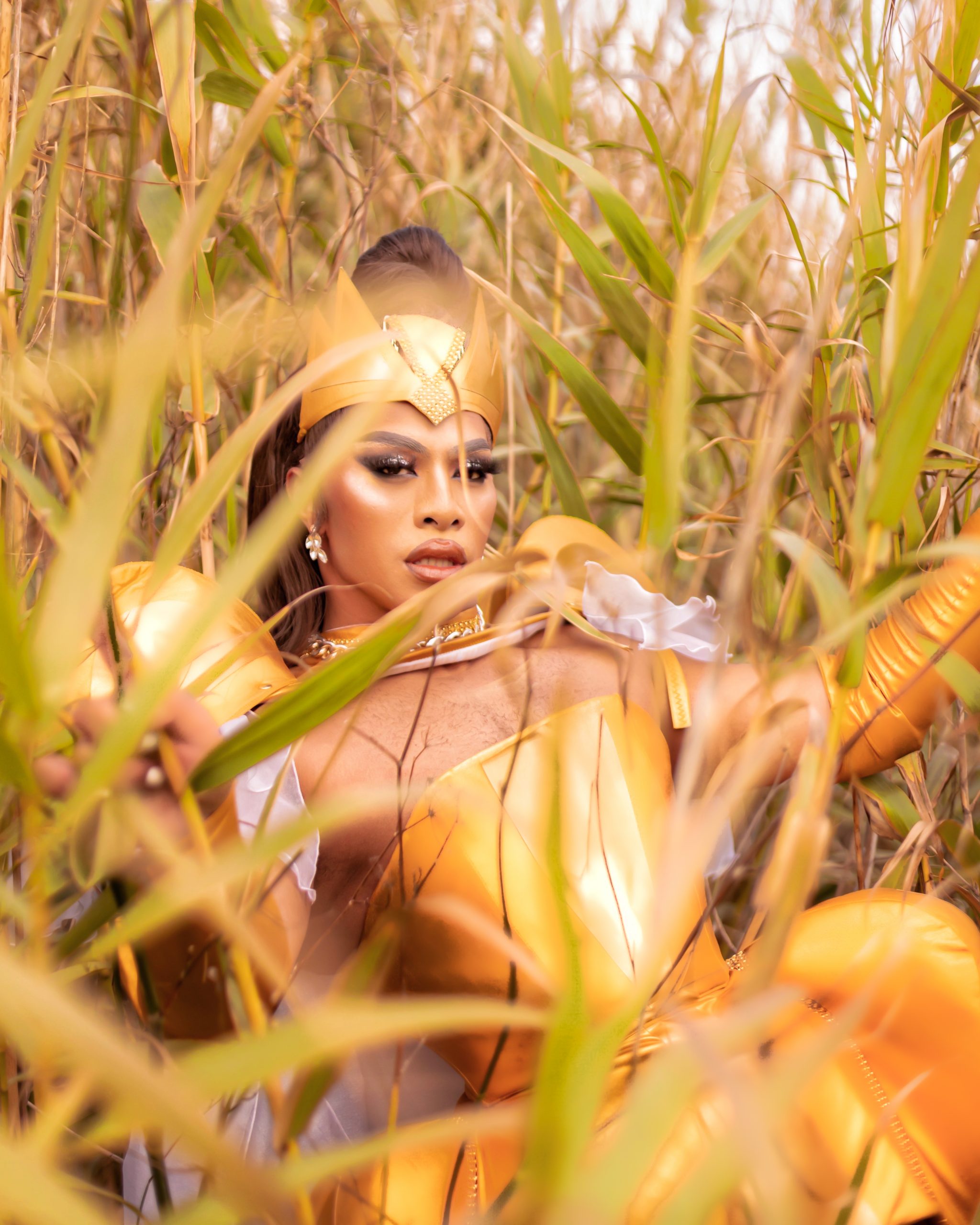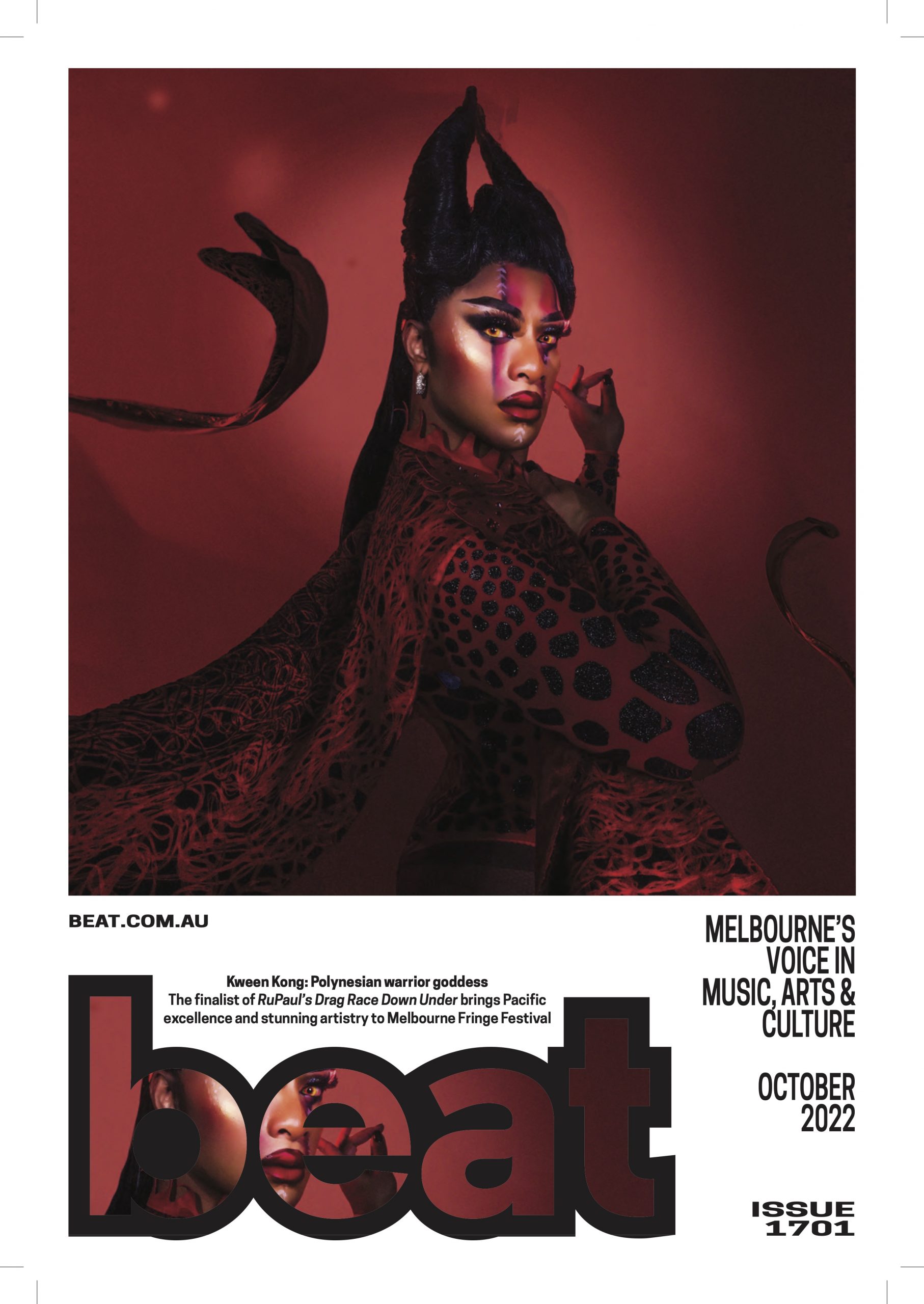The finalist of 'RuPaul’s Drag Race Down Under' brings Pacific excellence and stunning artistry to Melbourne Fringe Festival.
Becoming the first Pacific drag queen to reach the finals of RuPaul’s Drag Race Down Under was incredibly significant to Kween Kong and her community, but it was only one marker in the impressive trajectory that the supremely graceful South Auckland-born, Adelaide-based artist has been on.
Along with being a finalist on season two of RuPaul’s Drag Race Down Under, Kween (aka Thomas Fonua) has been a professional dancer since the age of 16 and worked for the Australian Dance Theatre, Red Sky Performance (Canada) and Black Grace (New Zealand), won the Prime Minister’s Pacific Youth Award for Arts and Creativity (New Zealand), completed an economics degree and master’s degree in cultural leadership, and created Haus of Kong – a safe space and community development group for queer youth who have been abused or kicked out of home, which aims to help them access the superhero within and achieve their dreams.
Check out Melbourne’s latest stage shows and theatrical events here.

Kween credits her triumph to being inspired by her Samoan-Tongan heritage, the strength of women in the Pacific community and coming from a long line of talking chiefs (Tulafale). Being a drag queen is her version of being a talking chief – a mouthpiece to keep the stories of her ancestors going through her performance and artistry and a creative means of fostering activism, representation and a lateral style of leadership based on hearing, negotiation and inclusivity.
“RuPaul said in the last episode that I’m the golden child that was able to go out and make a life for myself, but the reality of what it looked like was the village and women around me were the ones that made it a possibility, that helped hold down the fort and supported me to go out and achieve my dreams,” says Kween. “It’s beautiful to come from a humble background, but it’s also what’s kept me so grounded and have humility in my practice.”
“I attribute my strength, ferocity and power to my mum, sister and nanna especially. She’s the matriarch of our family. She passed away when she was young, but her impression and impact on our family has been lasting. Her name is Alofa, which is Samoan for love and she was love personified. She was unconditional love and also tough love. She was a conductor for a Samoan choir and that role is particularly a timekeeper, so she brings the energy to the choir and keeps everyone up. I see home videos of my nanna performing like that and seeing the attitude that she had. I always identified with that energy. When I think of women in general, especially in the Pacific community, women have a natural instinct to nurture and to lead with love. I think the biggest thing I love about my mum and my sister, my aunties, my nanna – they’re always here to pick up the broken pieces of men and families because men, especially in the Pacific community, are riddled with pride and ego because of this hierarchical system that we operate on. Being the head of a village, being the head of a family – it’s a lot of responsibility for one person to hold and if that person is tired, the roof falls over all of us and it’s the woman who picks up all the pieces and that build the broken men up.
“My strength and the version of Kween that lives within me is always going to have a divine feminine energy that comes from a maternal space based on those women that have taught me how to be strong and how to be a man.”
“That’s what it’s meant to me and what strength looks like. Outside of drag, I’ve always found it difficult to channel that energy because it’s more the physical transformation that has allowed me to access her. Going through the process of Drag Race and having those chats with Ru have made that talk a little easier and given me tools that made it accessible outside of drag too. The women in my life are some of the strongest women in life and the ones that surround me and champion me are all Pacific women. My niece is one of those people too – I see it in her. She’s got this fire and strength and it’s something inherent in the ancestry of our people. Kween Kong strives to be all those things.”
Starting at Black Grace dance company in New Zealand was ideal for the artist because it combined Western contemporary dance with world and Indigenous Pacific storytelling. “Because I come from a line of talking chiefs, my version of that is through my art,” says Kween. “This is how I continue our storytelling, through my drag, but also through all facets of my artistry. I’ve always been so proud to be a Pacific representation for our communities because growing up we didn’t have many examples – that kind of excellence and definitely not queer Pacific excellence on TV. The main representation we had was sportsmen like rugby players or criminals, so the idea of me going out to the arts was so foreign and also confronting, especially for my father (a Tongan talking chief). I want to be that representation for our next generation and to really encourage excellence within the Pacific community because our perspective on this world is really graceful, beautiful and not necessarily heard from, so I wanted to make sure we had a seat at the table, so we are heard, seen and acknowledged and championed.”
Moving from being a professional dancer for 13 years to a drag queen six years ago felt very natural for Kween and was more appealing because it allowed Kween to have an open dialogue and lateral conversation with audiences. Kween describes her experience on Drag Race as “such an incredible experience” and found new family in the winning queen Spankie Jackzon and fellow runner-up Hannah Conda: “I think in the long run, it’s really set me up for not only drag, but for life,” says Kween. “I found a new strength and power that I didn’t necessarily have access to before going through this process. It’s been life-changing. Those two queens really were sisters to me. Whenever I was in my head, Spankie would give me the mama treatment and Hannah would just make me laugh. Through that competition, I’ve gained two sisters for life.”
“I have so much love and respect for RuPaul,” says Kween. “For me she’s been one of the only examples of black excellence or POC excellence. I think the things that she really helped me through are the things that I needed since day one and I’ve been waiting to hear. She said that I’ve been neglecting my inner child and I need to give him permission to have fun and to be happy. I think that was my breakthrough moment. And then she had another massive conversation with me about shame and guilt, which is something my whole community really faces, especially in the queer community. There were so many pivotal moments for myself that I feel has put me on a path to even more strength.”
That strength, authenticity and the sheer magnificence of Kween will bring extra vibrance and invigoration to Melbourne Fringe Festival with Kween’s thrillingly fabulous event, Klub Kong. “After being on Drag Race, I’m super excited because one of the things I’ve been doing is producing my own work,” says Kween. “I’ve got some of the best Australian burlesque performers, drag performers, circus performers, side-show performers and human beings that I love and are in my circle. We’ve created an immersive space, so it’s really genre-defying. It’s going to be unlike anything you’ve experienced. Please dress up! Everyone should look up their 90s references. The DJs will be playing 90s music and the artists will be delivering some of the iconic moments across the 90s.”
Klub Kong will bring the ultimate party to Festival Hub: Trades Hall – Club Fringe on October 13.


